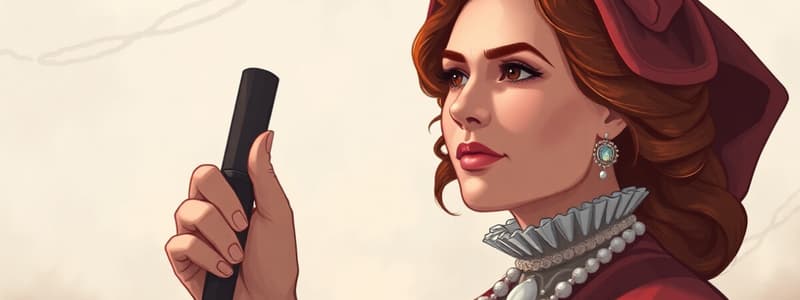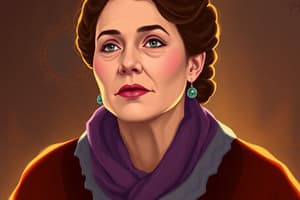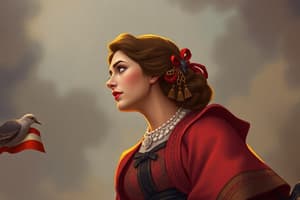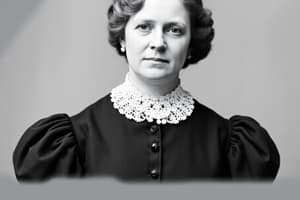Podcast
Questions and Answers
What significant aspect of the Haudenosaunee society is highlighted in regard to women's roles?
What significant aspect of the Haudenosaunee society is highlighted in regard to women's roles?
- Women were prohibited from making laws.
- Women were responsible for overseeing communal work. (correct)
- Women had no say in the approval of treaties.
- Women could only inherit property from their fathers.
How did Elizabeth Cady Stanton demonstrate her acknowledgment of Native American beliefs?
How did Elizabeth Cady Stanton demonstrate her acknowledgment of Native American beliefs?
- By addressing a female deity in her prayers. (correct)
- By participating in Iroquois rituals.
- By denying the existence of Native American spirituality.
- By only following Christian beliefs strictly.
What was the main focus of the History of Woman Suffrage published in the three volumes?
What was the main focus of the History of Woman Suffrage published in the three volumes?
- The role of men in supporting women's rights.
- The suffrage movement up to the year 1885. (correct)
- The achievements of women in the Iroquois tribes.
- The influence of Native American customs on modern society.
Which event closely preceded the Seneca Falls convention as indicated in the content?
Which event closely preceded the Seneca Falls convention as indicated in the content?
What perspective does Matilda Joslyn Gage’s statement in the illustration imply about her views on oppression?
What perspective does Matilda Joslyn Gage’s statement in the illustration imply about her views on oppression?
What significant role did Matilda Joslyn Gage take on in 1871 that was later highlighted in her writings?
What significant role did Matilda Joslyn Gage take on in 1871 that was later highlighted in her writings?
What was the primary focus of Matilda Gage's book Woman, Church and State?
What was the primary focus of Matilda Gage's book Woman, Church and State?
Which motto was used in each issue of The National Citizen and Ballot Box?
Which motto was used in each issue of The National Citizen and Ballot Box?
What ironic situation did Matilda encounter regarding her voting rights?
What ironic situation did Matilda encounter regarding her voting rights?
What was one of the outcomes of Gage's advocacy in New York State?
What was one of the outcomes of Gage's advocacy in New York State?
Which of the following characters from literature was influenced by themes similar to those in Gage's work?
Which of the following characters from literature was influenced by themes similar to those in Gage's work?
What was the fate of the voting rights granted to women for school board members in New York?
What was the fate of the voting rights granted to women for school board members in New York?
What was the significance of Matilda's name 'Ka-ron-ien-ha-wi' given by the Mohawk nation?
What was the significance of Matilda's name 'Ka-ron-ien-ha-wi' given by the Mohawk nation?
What specific perspective did Matilda Joslyn Gage advocate for regarding women's rights, contrasting her views with those of other suffragists?
What specific perspective did Matilda Joslyn Gage advocate for regarding women's rights, contrasting her views with those of other suffragists?
What specific societal force did Matilda Joslyn Gage perceive as a significant obstacle to women's progress and liberation, drawing a direct contrast to the beliefs of other suffragists?
What specific societal force did Matilda Joslyn Gage perceive as a significant obstacle to women's progress and liberation, drawing a direct contrast to the beliefs of other suffragists?
What unique approach did Matilda Joslyn Gage adopt to challenge the limitations imposed on women in society, setting her apart from other advocates for women's rights?
What unique approach did Matilda Joslyn Gage adopt to challenge the limitations imposed on women in society, setting her apart from other advocates for women's rights?
How did Matilda Joslyn Gage challenge prevailing social and political norms of her time, demonstrating a distinct approach to women's rights advocacy?
How did Matilda Joslyn Gage challenge prevailing social and political norms of her time, demonstrating a distinct approach to women's rights advocacy?
What specific cultural influence did Matilda Joslyn Gage draw upon to support her argument for women's equality and liberation?
What specific cultural influence did Matilda Joslyn Gage draw upon to support her argument for women's equality and liberation?
What specific aspect of Matilda Joslyn Gage's activism highlighted the potential for individual action to impact broader societal change?
What specific aspect of Matilda Joslyn Gage's activism highlighted the potential for individual action to impact broader societal change?
How did Matilda Joslyn Gage's upbringing shape her perspective on women's rights and her approach to activism?
How did Matilda Joslyn Gage's upbringing shape her perspective on women's rights and her approach to activism?
What significant event or experience triggered Matilda Joslyn Gage's early activism and passion for social justice, shaping her lifelong commitment to women's rights?
What significant event or experience triggered Matilda Joslyn Gage's early activism and passion for social justice, shaping her lifelong commitment to women's rights?
Flashcards
Who is Matilda Joslyn Gage?
Who is Matilda Joslyn Gage?
Matilda Joslyn Gage was an American women's rights activist, writer, and suffragist. She is known for her work on the Woman's Bible, a feminist critique of the Bible.
How did Matilda's parents influence her?
How did Matilda's parents influence her?
Matilda Joslyn Gage's parents valued her independent thinking and encouraged her intellectual development. Her father even took her on his medical rounds, teaching her subjects like Greek, math, and science.
How did Matilda's childhood shape her views?
How did Matilda's childhood shape her views?
Matilda's childhood was marked by the abolitionist movement. She was surrounded by an anti-slavery environment and witnessed the Underground Railroad firsthand. She became actively involved in abolitionist activities, distributing pamphlets and signing petitions.
When did Matilda publicly advocate for women's rights?
When did Matilda publicly advocate for women's rights?
Signup and view all the flashcards
How did Matilda challenge traditional views on women's rights?
How did Matilda challenge traditional views on women's rights?
Signup and view all the flashcards
What inspired Matilda's views on women's roles?
What inspired Matilda's views on women's roles?
Signup and view all the flashcards
What was the significance of Matilda's Fayetteville home?
What was the significance of Matilda's Fayetteville home?
Signup and view all the flashcards
What was notable about Matilda's daughter, Helen?
What was notable about Matilda's daughter, Helen?
Signup and view all the flashcards
What was unique about the Haudenosaunee society?
What was unique about the Haudenosaunee society?
Signup and view all the flashcards
How did Native American societies inspire Matilda Joslyn Gage?
How did Native American societies inspire Matilda Joslyn Gage?
Signup and view all the flashcards
What was Matilda Joslyn Gage's stance on oppression?
What was Matilda Joslyn Gage's stance on oppression?
Signup and view all the flashcards
Explain the matrilineal system of the Haudenosaunee.
Explain the matrilineal system of the Haudenosaunee.
Signup and view all the flashcards
How were women involved in Haudenosaunee governance?
How were women involved in Haudenosaunee governance?
Signup and view all the flashcards
What sparked Matilda Joslyn Gage's interest in women's suffrage?
What sparked Matilda Joslyn Gage's interest in women's suffrage?
Signup and view all the flashcards
What was Matilda Joslyn Gage's claim in Woman, Church and State?
What was Matilda Joslyn Gage's claim in Woman, Church and State?
Signup and view all the flashcards
What did Matilda Joslyn Gage's newspaper, The National Citizen and Ballot Box, focus on?
What did Matilda Joslyn Gage's newspaper, The National Citizen and Ballot Box, focus on?
Signup and view all the flashcards
What ironic event did Matilda Joslyn Gage experience regarding voting rights?
What ironic event did Matilda Joslyn Gage experience regarding voting rights?
Signup and view all the flashcards
What did Matilda Joslyn Gage's book Woman, Church and State focus on?
What did Matilda Joslyn Gage's book Woman, Church and State focus on?
Signup and view all the flashcards
What happened in relation to women's voting rights in New York State?
What happened in relation to women's voting rights in New York State?
Signup and view all the flashcards
What was the significance of Matilda Joslyn Gage's death?
What was the significance of Matilda Joslyn Gage's death?
Signup and view all the flashcards
Study Notes
Matilda Joslyn Gage
- Born March 24, 1826 – March 18, 1898
- An American activist
- Believed children should participate in adult conversations
- Her father, a doctor, educated her in Greek, math, and science
- She was involved in the abolitionist movement
- Her home was a stop on the Underground Railroad
- Married Henry H. Gage, had four children
- Actively supported the rights of African Americans, workers, and women
- Spoke at women's rights conventions
- Criticized religion for limiting women
- Believed in women's equality
- Wrote about Native American societies
Matilda's Beliefs
- Believed that women should have equal rights in society
- Thought women should have a say in government and society
- Thought women's participation in discussions, and decisions was essential
- Criticized religion for limiting the roles of women
- Thought women's participation in communal work was essential
- Women's ability to make decisions and have power was significant
- Felt women could play significant roles in every aspect of life
Matilda's Early Life
- Raised in a household where her opinions were considered
- Her father was a doctor who taught her Greek, math, science and anatomy
- Her father dissected animals to help her learn about anatomy and the systems of the body
- Her house was a stop on the Underground Railroad, and she learned about abolitionist movements
Matilda and Suffrage
- Spoke at a women's rights convention in Syracuse, NY at age 26
- Was the youngest speaker at the convention
- Unlike some activists, she didn't base her activism on religion
- Believed religion limited women's opportunities
- Was a key figure in the suffrage movement
- Wrote a series of articles about the Iroquois tribes in the New York Evening Post
- Wanted balanced participation in government and society
- Aimed to change societal norms and the roles of women
Matilda's Later Life
- Edited a suffrage newspaper, The National Citizen and Ballot Box (1878-1881)
- Wrote essays on women's issues, including the right to vote, marriage, church, and societal customs
- Wrote Woman, Church and State (1893)
- Argued that Christian faith and male leaders conspired to oppress women
- Received an honor from the Mohawk nation, became a member of the Wolf Clan, signifying the respect and recognition she received
- Died in 1900
Studying That Suits You
Use AI to generate personalized quizzes and flashcards to suit your learning preferences.




